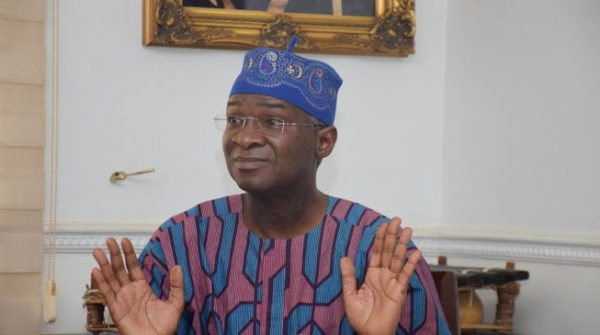The Minister of Works and Housing, Mr Babatunde Fashola, on Wednesday described the reports claiming the state of Nigeria’s roads as poor to be mere hypes.
According to him, Nigerian roads are not in a bad state as often portrayed.
Fashola was responding to question for him to justify the huge amount of approvals given for Nigerian roads and yet in terrible state.
He said “The roads are not as bad as they are often portrayed. I know that this is going to be your headline, but the roads are not that bad”.
He said that if not for funding challenges, most road projects would have been long completed.
Fashola also said that some parts of the country faced peculiar issues like high water table, which made construction in the rainy season difficult.
According to him, the South-East and South-South are among areas with such difficulties.
He also said that the ministry and contractors were waiting patiently for the rains to subside so that they could return to sites.
He said: “When I come here to announce that a particular amount was approved for a contract that doesn’t mean the amount has been paid contrary to what you suggest.
“You are mindful also that minister of finance, different arms of government are escalating the fiscal challenges we face as a nation in trying to fund the budget. You are also mindful that the last few budgets in Nigeria for almost 20 years have been deficit budgets and these are terminologies that are realities and I think we should acquaint ourselves with if we are not just to report news but also educate the public.
“You must also be aware that between awarding a contract and also mobilizing to site there is a distance. First of all we have to have an agreement that is the relationship between the ministry of works or any other ministry and the ministry of justice, then there is a role that banks play, they have to give guarantee.
‘These are things that I would like to know if I was a correspondent in order to be able to help me inform members of the public.
“Building materials – rocks, laterite, quarry, iron rode have to be ordered, construction companies don’t keep them. The process of producing blasting rocks requires approval from the office of ministers of Justice and even the office of the NSA to get approval to get dynamite.
“All of these are the things that go on. So the point that I am making to you is that there is a distance between approval, implementation, actual construction and the result.
“The other point I wish to make known to you also is that the problem of the other places you talk about – Warri, Benin – Sapele road and the South East, first of all you must understand that those places don’t stand in isolation, the Niger Delta is the longs of Nigeria that is a rain forest. It’s a high water table area.
“These problems are not as pronounced now in January and February, the reason is that, that is the dry season of the year.
“This is the raining season, it’s weather conditions and there is no country in the world that doesn’t face transport challenges in an extreme weather. In some places it’s winter and snow they cancel flight, it’s transportation, they cancel rail programmes. In some places it’s typhoons, hurricanes while in some places you can’t even come out.
“So this is the season, we are just getting to the end of the raining season. Flood, it will affect road, we have seen cities submerged, we’ve seen infrastructure blown up in other parts of the world, it’s one world – it’s the rainy season, it’s the same planet, this is our own time to experience it. It’s moving out of Nigeria now and going somewhere else.
“So what we experienced in this year is unusual, it’s not a good time to be in the transport system. We also want this season to quickly end so that we can go back to work during the dry weather.” he said
He assured Nigerians of massive mobilization of contractors for roads rehabilitation ahead of the Yuletide season
He said: “That takes me to the point about preparation for the end of the year. You know that we have the ember months preparation, the team has already started work we would be working with law enforcement, we would be working with FRSC and we would be working with our contractors.
“The plan is that, in places where they have not yet constructed, they should make palliative so that the heavy traffic movement during the end of the year is manageable and reduce the inconvenience of our commuters.
“You must understand also that on every road where construction is going on it’s a construction site. So help us manage the understanding of the public that you can’t drive through a construction site at normal speed. The ideal thing is that you slow down a construction site but we can’t afford to do that. We regret it but we do our best to bring them to the barest minimum.

“The inconvenience is pronounced also by way that we don’t control weather and if we don’t have rain fall in one year it will also affect food as well. So these are the realities of existence about three months in every year and then we will move on to much better weather.
“Let me also say that today in council my colleague in transportation Rt. Hon Rotimi Amaechi announced something we expect to benefit from those initiatives on some critical routes during the next few weeks that will bring the relief to our roads network as those rail service come on stream. I am confident that all of these problems would become history within a short time. We just have to understand what we are dealing with hear.” he said
Source: thenationonlineng




